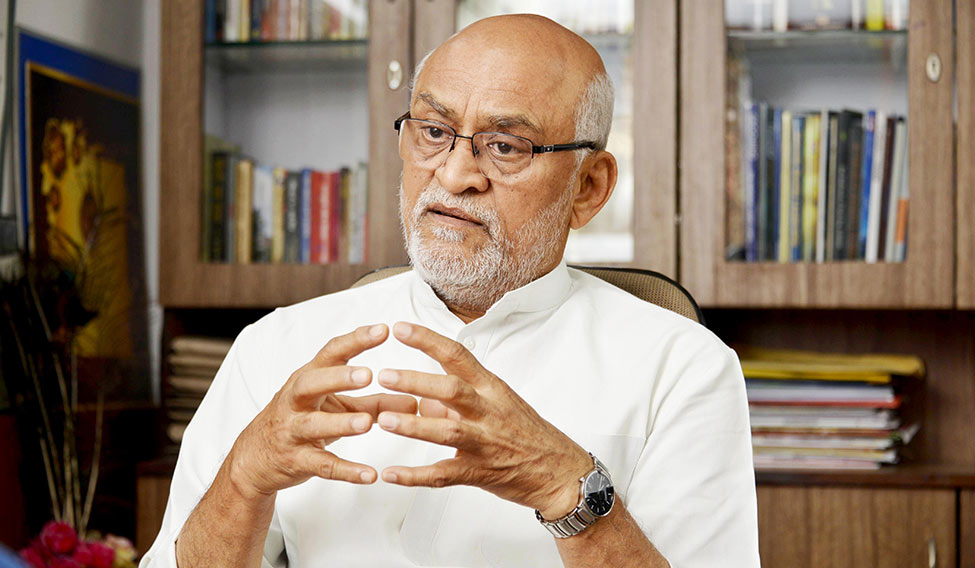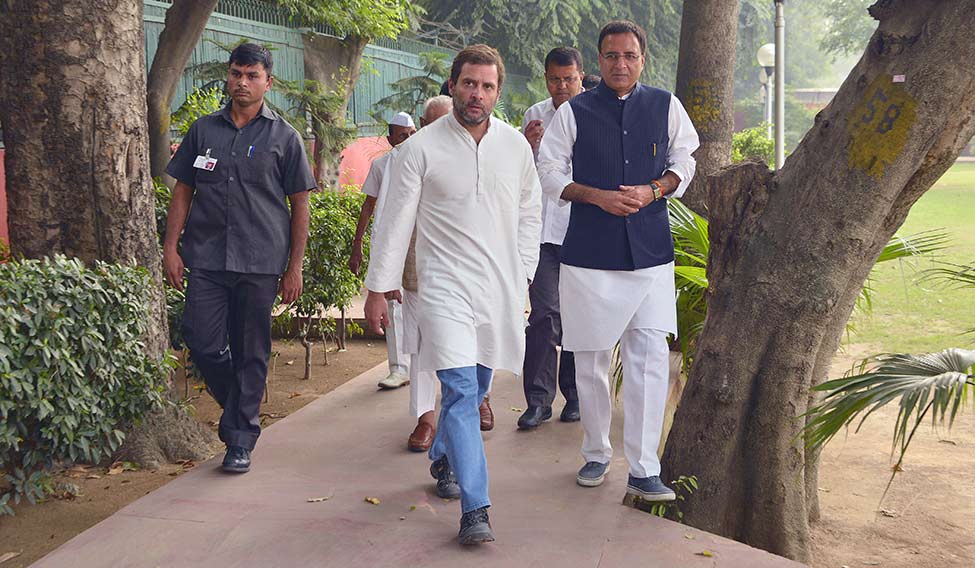A defining moment in the long history of the Indian National Congress was in the afternoon of September 28, 2013—a moment that screamed change. Party vice president Rahul Gandhi stormed into the Press Club in Delhi, where Congress spokesperson Ajay Maken was holding a press conference. Rahul snatched the microphone and said the United Progressive Alliance government’s ordinance to negate a Supreme Court order disqualifying convicted MPs and MLAs was “complete nonsense that should be torn up and thrown away”.
It was the moment when Rahul took charge of the party. For only a day earlier had the senior ministers discussed with Congress president Sonia Gandhi a point flagged by the President of India—what would they do if the Supreme Court strikes down the ordinance? Sonia discussed the issue late into the evening, and decided that the cabinet would reconsider the ordinance after Prime Minister Manmohan Singh returned from Washington, and they would withdraw it.
“It cannot be that Rahul was unaware of this. Yet he chose to do it his way,” said a senior party leader. This one incident, he said, pointed to what to expect of Rahul and what the Congress might have to prepare for with him in charge.
That theatrical outburst, though well-intentioned and strategised, resulted in sporadic suggestions that Rahul be made party president. Four years down the line, the frequency of that demand has somewhat subsided. The party has been reduced to 44 members in the Lok Sabha, and it rules in just four states—Karnataka, Meghalaya, Himachal Pradesh and the recently reclaimed Punjab. It was rejected by people in Uttarakhand and Uttar Pradesh, and in Manipur and Goa it failed to spot and grab the opportunity.
The victory in Punjab is widely attributed to the freedom Captain Amarinder Singh got to do things in his own way.
The earlier assembly polls were a big miss for the party, with a frightening reality sinking in among Congressmen and people who believe in the party that the BJP’s dream of a “Congress-mukt Bharat (Congress-free India)” was indeed round the corner.
And, Rahul continues to remain vice president even as many leaders clamour for the return of Sonia in decision making. “Congress can’t be managed like a private limited firm. It is a large, mass-based party with a long history,” said Satyavrat Chaturvedi, party’s chief whip in the Rajya Sabha. “Sonia’s style was more like Jawaharlal Nehru. Sometimes she was too democratic. On every issue, she’d consult seniors in the Congress, discuss issues threadbare and take a sound decision based on the advice of her senior colleagues. She also met Congress workers, and so had inputs from grassroots level, which led to socially and politically appropriate decisions.” He said the current decision-making system did not follow this procedure.
After the Lok Sabha election debacle in 2014, Chaturvedi had said that the Congress needed a cardiac surgery, not a cosmetic change. Parties win and lose in democracy, but they needed an honest and ruthless introspection, based on which they should rectify mistakes, he said. “People in the country, the party workers and a person like me expected that. It has been three years now and not a leaf has moved. It hurts everyone. We expected those who lost to take a back seat. There is no dearth of talent to put up a Congress that can face the challenges, meet the aspirations of every section,” he said.
Senior leader A.K. Antony has headed three committees on different occasions to find the reasons for the party’s election debacles. A party leader said none of the recommendations has been acted upon. Another one said though no Congress leader had seen the reports, BJP president Amit Shah had, and he had been using it to his party’s benefit. Apparently, an important observation Antony made was that the Congress was seen as appeasing the minorities, which did not go down well with the Hindus.
 Satyavrat Chaturvedi, Congress chief whip in the Rajya Sabha
Satyavrat Chaturvedi, Congress chief whip in the Rajya Sabha
A senior party leader said many things had gone wrong with what Rahul did in the party—like how the elections were held in the Youth Congress and the National Students Union. “Youth is our strength. In the old days, Sanjay Gandhi brought people who are still serving the party. The people who came with Rajiv Gandhi, too, have done very well for the party. But, Rahul’s experimental way of bringing new life and energy has failed,” he said.
In the old days, leaders seamlessly moved from the NSUI to the Youth Congress to the Congress, and the people in all three were well connected and coordinated. “Now, that culture is gone. There is no coordination between the seniors and the juniors,” said the leader.
It is not that Rahul did everything wrong. He put the spotlight on Kalawati in one of his early speeches in support of the Civil Nuclear Liability Bill, and spent time in the house of a widow whose husband had committed suicide. He thundered in his own way at the Kisan Khet Mazdoor Rally, and contributed to the Narendra Modi government’s controversial Land Bill falling by the way. His “suit-boot ki sarkar” phrase was echoed by other Congressmen. But, as a former Congress MLA said, they were not exactly what the party men needed. “If I want to meet him now, it does not help if I am given time six months later,” he said. “There is simply no such thing as accessibility.”
And, not many are happy with “outsiders” hijacking the party. “Lately, so many outsiders have come into the party, and become part of the high command; they even distribute tickets,” said a leader from eastern Uttar Pradesh. “The Congress always depended on and trusted the workers, the ordinary Congressmen. Now there is PK [Prashant Kishor, the poll strategist]. We win in his surveys, but lose the actual elections. ”
Apart from his sister Priyanka Vadra, Rahul is said
to consult K. Raju, former joint secretary of the National Advisory Council, on most matters. Mohan Gopal, director of Rajiv Gandhi Institute of Contemporary Studies, also guides him often. At Rahul’s office, Kaushal Vidyarthee and Sachin Rao form his research team; the former also keeps an eye on his appointments. At the party office, general secretaries C.P. Joshi and Madhusudan Mistry are said to be close to him. And, he discusses issues with Sachin Pilot, Jyotiraditya Scindia, Rajiv Satav and Jitin Prasada whenever he feels like.
He, however, fails miserably when he addresses the mass. “He cannot establish a connect with the people. The communication style has to be improved if we are to take on the BJP that communicates well and does nothing on the ground,” said a Congress worker, who was waiting outside the party headquarters on Akbar Road to see a leader. Another man thought Rahul needed to brush up on his Hindi.
Rahul’s inability to be decisive was visible when he dithered over the alliance with the Samajwadi Party in Uttar Pradesh. “For months he was bashing Akhilesh, and when they eventually decided to fight in partnership, it was too late. Workers need some time to absorb such things. The result of the alliance was disastrous. Timing is key in politics,” said a leader from Uttar Pradesh.
Many leaders say Rahul’s tasks should begin with open-hearted, closed door deliberations. But, he has not initiated it yet. “Instead, we are wasting time talking about the BJP’s claim that Muslim women voted for them,” said a former MLA. Then he should nurture strong regional leaders. “When you don’t allow that leaders to develop and instead go with personal likes and dislikes, the leadership weakens, the central leadership weakens and the party loses ground,” said Chaturvedi.
Despite the sporadic cries for a leadership change, no prominent leader in the party supports the idea. “Asking Rahul to resign is not the solution. Unfortunately, we are hearing such talk in some quarters. But, that is not the answer. More important is to rectify mistakes, learn from debacles,” said Chaturvedi.
What most party men and state leaders are looking for is not immediately getting back to power, but rejuvenation of the party. They expect the leadership to act quickly. They see in their party’s health and strength, the health and strength of Indian democracy. “There is no crisis of leadership in the Congress. The BJP is creating a communal flare up, misleading people. It will not take long for the people to see through their statements and actions. When that happens, they will have only the Congress as an option across the country, and Rahul Gandhi will be seen as a hero,” said Shakeel Ansari, former party secretary.
Amarinder Singh also has no doubts about an early comeback of the party. “The results in Punjab, Manipur and Goa have shown that the Congress remains a force to reckon with.Let the process of empowerment of regional leaders move forward with even more aggression than before. Let the process of ticket allocation be completed well in advance so that selected candidates can reach out to the voters without having to look over their shoulder for a last-minute surprise,” he said.
Rahul clearly needs to listen to state leaders, and give them freedom for the Congress to revive.








